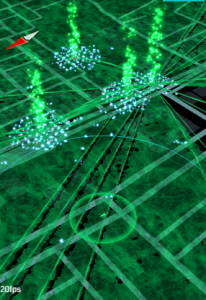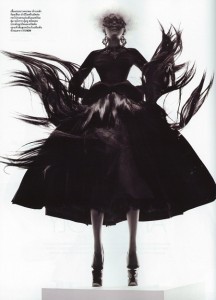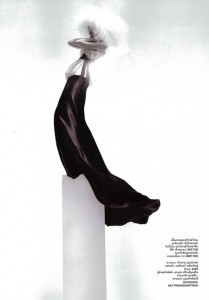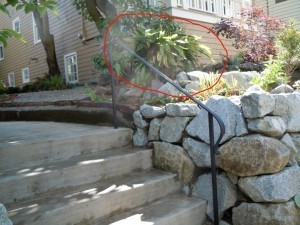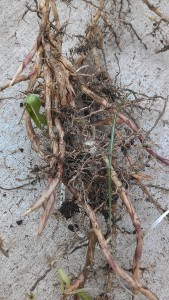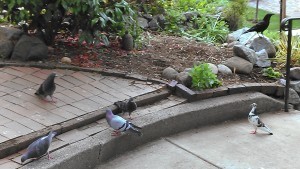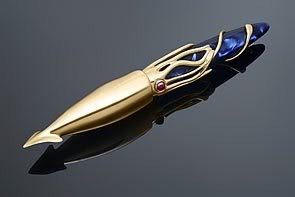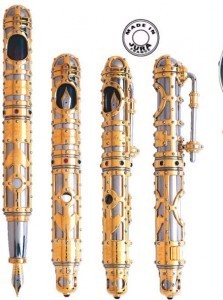Leah R. Cutter's Blog, page 26
June 16, 2013
Story Inspiration Sunday
I blog about inspiration both here and at Book View Cafe. Feel free to comment either here or there!
————-
I have a secret.
But I’ll tell you.
Since it’s only just us two, right?
(Looks around)
Come closer.
I’ll whisper it to you.
I’m a geek.
I know! I know! I’m a writer. I’ve published books. I must know things, and be authorial, and wise.
I may be some of those things. But I am also, at my heart, a geek.
Let me show you my geekness!
See that? That’s a symbol of the team I play on. We’re called the Enlightened. (This is actually the Seattle Enlightened icon.) We are the artists, the explorers, the inventors. We’re here to guide humanity to the next phase.
The other side call themselves the Resistance. They fear the coming changes, the enlightenment we bring, and are entrenched in their old ways.
The game is called Ingress.
You see that person standing beside you, intently tapping on their phone? They may not be creating a text message or tweeting something. They may be playing Ingress.
Ingress is a game created by Google. It’s a thin layer of “virtual” spread over reality.
Public sculptures and other areas of interest have been turned into portals. The two teams battle over the portals, flipping them from green to blue and back again.
Here’s what my viewscreen (phone) looks like:
Because it’s based in reality, you start to see the world differently. You start to look at art, and wonder if it has extra energy you can use. You look at parks and sculpture and wonder about the forces that created it, and that put it here. You never feel alone when you’re walking in the city, because there are always these portals, all around you.
You also start getting paranoid about everyone on a phone. Because the game is only on Android devices, you get really, really good at spotting iPhones.
You look for places where you can hide in plain sight, where you can attack (or defend) a portal from another player and they can’t see you.
You start putting together different outfits, so the other side won’t recognize you when you walk by and steal all their energy.
And you make up stories, lots and lots and lots of stories, connecting the art and the people and the long walks you take in order to play.
And if you’re really into puzzles and games, you keep track of what’s happening over on The Niantic Project wall. Every piece there is a hidden clue. You have to examine the code behind the picture in order to see them, frequently. Then you have to figure out what the code means. Solving the code gives you stuff in the game. The Decode Ingress site lists many of the solved puzzles.
So what kind of stories would you tell about a virtual reality that’s completely addictive (seriously, I wouldn’t warn you about it if it wasn’t) and makes you move? The only way to get to many of the portals is to walk. I know serious gamers who are now losing weight because they’re playing (and walking.)
Me — I love the portal art. Portals have beautiful skins that move up over them as you approach. I have envisioned another version of the game, someplace with a lot less gravity, where you get to ride that wave as it flows up. Someday I’ll even write that story. But if this inspires you to commit Story, please do so! Whatever you create will be 100% different than what I create.
Crossposted from my website. If you'd like to comment, you can do so here or there.
June 10, 2013
Free Fiction Monday — Shadows’ Door
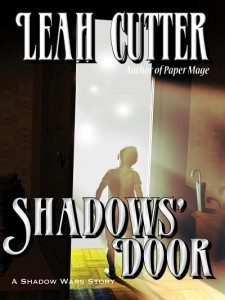 On July 9th, my new novel, The Guardian Hound, is being published by Book View Cafe.
On July 9th, my new novel, The Guardian Hound, is being published by Book View Cafe.
I am still incredibly excited about this.
In the five weeks leading up to the novel release, I plan on publishing a short story a week, and having each available for free for that week. All the stories are about the world or somehow involved with The Guardian Hound and the raven clan.
This story is actually the first chapter of The Guardian Hound. At the end of last year, I told myself that I was going to switch to writing a bunch of short stories, and not work on the next novel.
My muse thought she’d be sneaky and get around that by producing a series of short stories about the novel.
I gave in pretty quickly. This was actually the last of the stories I wrote.
Enjoy!
Shadows’ Door
Germany, 1940s
Hans reached for the falling beaker, but it was too late.
Silence filled the lab after the sound of shattered glass, all the scientists at their stations standing perfectly still.
“Just a harmless solvent,” Hans called out. No acid to eat through the pristine white countertop, no noxious gas to make them all flee.
However, the scent of the bitter chemicals overwhelmed his sense of smell: He wouldn’t be able to scent or track anything for the rest of the day. Luckily, despite being a member of the hound clan, he didn’t need to. They lived in a city now, not the country, and he didn’t live by his nose, not like Grandpapa had.
“Hansel Von DeWhite!” shouted Master Koenig, striding from the front of the lab to the back corner where Hans had his equipment set up. “What were you thinking? You weren’t, of course,” Master Koenig blustered on. “You must be more careful.”
“It was just a solvent,” Hans said weakly as he gingerly lifted away the pieces of broken glass, putting them into the waste container on the floor.
At least it hadn’t splashed and stained Hans’ white lab coat. Then he looked more closely and sighed at the splatter marks down his right side. He couldn’t afford to get it cleaned so soon; maybe he could wash it in the kitchen sink at the house. After a quick glance all the way down, he breathed a bit easier: He hadn’t ruined his shoes. Again.
“Yes, yes, we all know that, we all heard it. But what if your clumsiness had upset someone else’s experiment?” Master Koenig paused and pulled his own lab coat tighter across his expansive chest. “I was with poor Wilhelm up front. What if your inexcusable noise had startled him at a crucial part of his process? Hmm?”
“But sir—” Hans started. He should have known better. Once Koenig got going, nothing short of an explosion would derail him.
“Now, I promised your father and his friend that there would be a place for you here at the Laboratorium.”
Hans didn’t groan, though he wanted to. Of course, Master Koenig would bring Hans’ father into it. Hans continued to focus on carefully, slowly, picking up the shards of glass and disposing of them. Clink, clink they went as they broke against each other in the container, a soothing sound.
“And you do have a place here for the rest of the year.” Master Koenig gave a dramatic pause. “But.” He sighed.
Hans found himself holding his breath.
“Only until the end of the year. Then you should seek employment somewhere else.”
Hans wasn’t surprised. He’d known his position as a lab attendant at the Laboratorium was in jeopardy since the first week, when he’d misread the instructions for the experiment he was conducting, verifying a scientist’s work, and the resulting acid had poured out over the shining white counters and all over the floor, ruining Hans’ shoes as well as the work of several nearby researchers.
Still, Hans turned to Master Koenig and said, “But sir—”
Then he realized his mistake.
He’d just swept his hand through the remaining glass.
“Oh, for heaven’s sake, man,” Master Koenig said, grabbing Hans’ hand and examining it. “You didn’t cut anything major,” he said sourly.
“I’ll get a plaster for it, sir, then finish cleaning up,” Hans said grimly. It didn’t hurt, not really, but blood was already welling up and trickling across his skin. The salty scent threaded through the bitter chemical smells, faint but reassuring. Maybe his hound nose wasn’t completely ruined.
“No. Leave. Get that seen to and don’t bother returning until tomorrow.”
“But—” Hans deflated at Master Koenig’s stern look, the way his arms crossed over his barrel chest. Even the points of his white mustache quivered with disapproval and disappointment.
“Yes, sir,” Hans said. He grabbed a towel from the cabinet and wrapped it around his wrist, holding his hand high so the blood flowed into it and didn’t drip onto the floor.
Hans pretended to be busy with the towel and his hand as he made his way to the front of the room, past all the other attendants, so he wouldn’t hear their sniggers, wouldn’t see them laughing.
He still heard their comments in his head—he’d heard them all his life. Dumm Hans. Ohne jedes Feingefüehl. Clumsy, awkward, no good Hans.
He’d always been a disappointment, to his father, the hound clan, and himself. He wished more than anything that there was something he could do to prove himself, or, at least, to stop making so many mistakes.
But what?
# # #
Hans hurried down the quiet Luisen Strasse, wanting to get back to the house ahead of Father. The row houses that lined the street were half-timbered, old, and falling apart. However, the front gardens they shared were often beautifully tended, full of the first spring daffodils, brilliant purple Prague flowers, and white crocuses.
None of those modern automobiles came down this quiet road; no one living here could afford one. It was one of the reasons why Hans and his father lived in this neighborhood—the smell of the smoke from the engines was noxious and gave them both headaches. Hans didn’t know how the humans stood it.
Hans paused when he spied the leather-like leaves and light mauve blossoms of a Lenten rose. If they’d still been living at home, in the country, he would have made a point to tell Grandpapa about the plant. It was a good repellent for insects and rodents.
Grandpapa had taught Hans about all the flowers and plants. He’d been the village Apotheker, an old country doctor, not one of those city types with a degree who had no idea what they were doing. He had cases of books with recipes for potions, spells, and charms.
Hans and his father had moved to Hildesheim when Grandpapa had died, selling the old house. Father had always claimed that he had a better nose for numbers than for smelly plants and potions, so they’d come to the nearest large town.
However, they didn’t have the family connections or money for Father to become a banker. Instead, he worked as an accountant, drinking more heavily every day and grumbling about other people’s mistakes. He was too proud to go to the hound clan to ask for a recommendation for himself: He refused to go begging to the sight hounds. He’d used his own connections—a cousin’s friend’s brother—to get Hans a job at the Laboratorium.
Father and Hans were scent hounds. They would make their own way, as they always had. The court—composed of sight hounds—wanted nothing to do with them.
Hans missed the countryside, missed Grandpapa, missed his cousins and his uncles. He would have missed his mother if he remembered her, but she’d died when he’d been young. He only vaguely knew her scent from the kerchief of hers that Father kept.
Grandpapa would have made a joke about the lab today, telling Hans that he was just a pup who hadn’t grown into his paws, giving Hans hope.
Hans paused, looking at the Lenten rose, thinking furiously.
Grandpapa’s books had cures for everything: From wasting diseases to falling down sicknesses, from childbirth to passing stones.
Father hadn’t liked Grandpapa’s work, and he’d insisted that Hans be a true scientist instead of following the old ways. Not that Hans had wanted to become an Apotheker—he’d followed Grandpapa around out of love, not because he was any good at herbs and spells.
But maybe, maybe, Grandpapa’s books held wisdom still, as well as a cure for Hans’ current dilemma. There wouldn’t be a spell for fixing his life, but if only he could be a little smarter, or braver, or something.
Hans hurried the next few blocks to their house, barely nodding to the two cross old women dressed in black along the way.
The row house had originally been owned by a pair of elderly sisters. Their children rented it out but hadn’t bothered to redecorate it. While Hans wasn’t a muscle man, the pink, white, and rose paint and wallpaper stifled him. He tried to be out of the house as much as possible. The backyard was acceptable, even though it was just a small patch of grass with roses and more roses growing along the edges.
Luckily, Father’s coat didn’t hang on the white-painted coatrack next to the door. Hans threw his own suit jacket on the rack, as well as his hat, not bothering to unlace his light, leather “dandy” shoes (oh, how he missed his field boots!). A narrow white staircase went directly from the door on the ground floor to the first floor, the walls decorated with framed, poorly drawn pencil sketches of the town, done by the sisters.
Hans raced up the stairs, then paused in the hallway. The first room was his, smaller and overlooking the street. The second, in the back, larger and more quiet, was Father’s. More awful sketches lined the hallway, along with some truly hideous watercolors.
In the center of the hallway, a long black cord hung from the ceiling. It opened the trap-door to the attic. The ladder they used for access rested against the wall, skinny, shaky, and painted white, of course.
Hans had to jump for the cord, but he caught it first try. The smell of old paper, storage straw, and cotton batting drifted down. Hans placed the ladder carefully, making it as stable as he could, before he climbed up.
The attic was directly under the steep-pitched roof. Just the center of the room had a floor, composed of rough planks. The center was the only place Hans could stand straight up. Bare, coarsely hewed beams ran from underneath the small center platform to the edges, where the roof sloped down. A layer of cotton batting, serving as insulation, ran between the beams. The ceiling was bare wood as well, with nails sticking through.
Small windows set high in the peak of the ceiling on either side of the attic gave Hans enough light to see his prize: Grandpapa’s old trunk. It was made out of green leather, with wood reinforcing the square bottom, and thin tin strips running across the domed cover.
Hans picked his way through the other trunks containing their winter things: jackets, boots, heavy blankets, and quilts. Hans grunted with pain when he closed his hands around the aged leather handles of Grandpapa’s trunk. He ignored his injury and tried to pick up the trunk anyway, then quickly put it back down. It was heavier than it looked and the handles grated against his injured palm.
He looked at the chest, then at the opening to the downstairs. He’d never be able to carry it alone, particularly not injured. With a sigh, Hans sat on the cold, rough boards and opened the trunk.
The musty smell of dried rosemary, bitter geranium, and delicate lavender floated up. On top lay one of Grandpapa’s old journals, hand bound in leather.
Hans eagerly opened the book, marveling at the perfectly preserved yellow pansy pressed between the first pages. He recognized this book. Grandpapa wrote out his observations and notes on his experiments in it. He had been forever trying new combinations of herbs, flowers, weeds, roots, leaves—anything he found in the woods that he hadn’t seen before.
It was a wonderful reminder of Grandpapa, but not the book Hans sought.
A packet of letters neatly tied together with red ribbon came next, followed by two more journals, and Grandpapa’s military service record, recorded on heavy red and blue paper.
Finally, at the bottom of the trunk, Hans found the black book he’d been looking for, bound in thick leather with gold embossed writing on the cover: Heilungen—Healings.
Hans carefully put the other items back in the trunk, though he hesitated over the journals. Maybe another day he’d come and fetch them. He closed the trunk with regret. It was all he had left of Grandpapa. The ache in Hans’ heart made his breath catch. He missed him so much.
Now, he had to make his Grandpapa proud.
With the book firmly wedged under his arm, Hans backed his way down the narrow ladder, breathing a sigh of relief when he reached the ground still holding it. Hans leaned the ladder back against the wall, then pushed at the trapdoor.
It didn’t budge.
Hans jumped and pushed it, snapping it shut with a loud bang, making him jump.
“What’s that racket?” came Father’s voice from downstairs.
“Nothing!” Hans called, hurrying down the hall toward his room. If only he could get the book put away before his father saw it….
Of course, Hans’ luck was never that good.
“What are you doing?” Father asked as he topped the stairs, his face as ruddy as if he’d already had three shots of brandy. He wore his office suit, black and formal, though his magenta tie was askew.
“I—” Hans started.
“What is that?” Father asked, striding forward and slipping the book out from under Hans’ arm.
This time, Hans didn’t try to explain. How could he? He was already such a disappointment to everyone. It had been a stupid idea, to think that one of Grandpapa’s potions could help his mess of a life.
“Huh,” Father grunted, handing back the book. “You worried about your hand?” he asked, indicating the bandage Hans had wrapped around his palm.
“Yes,” Hans said instantly, relieved. He did have a good excuse to have this book! “It was just a solvent beaker, but it burned like acid,” he lied.
“You take care of yourself, then,” Father said, almost gently. “And don’t go burning the neighborhood down with any concoctions you make,” he threw over his shoulder as he marched down the hall, going to his room at the back and slamming the door.
Hans took a deep breath. Now, he didn’t have to hide anything.
All he had to do was find something that would help.
# # #
Curled over the tiny desk in his frilly bedroom, Hans found the spell he wanted: Opening of the Mind.
It was like a Kraftsuppe, a “perfected” broth, but instead of fortifying the body, it was meant to heal the mind. It would make him open to possibilities, including the ability to learn what was needed.
However, it wasn’t a simple culinary recipe. It contained more ingredients than any meal Hans had ever cooked. Not only infusions, tinctures, and herbal waters made up the potion, but spells needed to be performed both before and after a particular ingredient was added.
Hans had never been that good at magic; many in the hound clan weren’t. Luckily, the spells seemed simple enough, and he’d only have to add a few charms to the corners of the kitchen, as well as memorize some blessings to be uttered over the herbs.
After reading through the steps carefully, Hans decided he could do it. It was no different than a complex experiment, like what he performed at the lab. He would just have to keep track of each step, and be more diligent than ever.
The biggest problem would be finding all the ingredients. Hans already knew not everything on the list was readily available. Plus, as he’d learned to his chagrin, the country names for things at the market were not the same as the town names. He’d have to figure out how to translate the names of some of the rarer herbs to something the people here would understand.
Hans sat back on the tiny chair and sighed, disappointed. He’d wanted to find a spell that he could use tonight, which would change Master Koenig’s mind about him so it would be easier when he went back to the Laboratorium tomorrow. He’d have to explain it to Father, somehow, as well, when he started making potions.
But Hans was determined. He’d be ready by the end of summer. Time enough to prove to Master Koenig, his father, even the hound clan, that he could be something more.
# # #
Hans looked longingly at the rabbits hanging at the butcher’s at the market, but they couldn’t afford such luxuries here. Rabbits hadn’t been a luxury at home: He’d hunted many himself, his hound soul tracking the scent through fields and woods.
For a moment, Hans’ felt his hound soul stirring. It didn’t wake as often in Hildesheim as it had in the country. It nosed up to him, regarding him with pleading basset-hound eyes.
He would have to transform in the next week or so. They needed a run.
Homesickness washed over Hans. Maybe for the Silvester holidays he could go and visit his cousins, and spend a week running in the fields and woods.
Hans shook himself. He couldn’t afford to daydream, not here, not now, with his hound soul so close. He bought what he could, a few cast-off bits of chicken, enough for a stew.
Then Hans made his way over to the northeast corner of the market, where the old women in black dresses and embroidered kerchiefs held court. They came to market with goods they’d made: Pickled onions and carrots, newly spun wool and thick sweaters, berry preserves and honey.
Hans had discovered them early in his search for ingredients. They’d been a gold mine of information as well.
Old Engel waved to Hans as he approached. Her plump cheeks were rosy, and curls of her iron gray hair stuck out from underneath her black kerchief. Her eyes were a watery blue, faded as if they’d stared at the sun too long, in her weathered, wrinkled, browned face. “Eh, got a present for you,” she said, pointing behind her seat.
Hans smiled. Old Engel wasn’t as disabled as she pretended to be: He’d seen her stand quick enough when a bee came buzzing. But he indulged her and walked behind her seat. A large burlap sack sat on the ground. Hans picked it up and walked back around.
“What is it?” he asked as he opened it. It was full of pungent leaves, green but starting to wither.
“Thorn apple,” Old Engel said.
“Really?” Hans asked, looking back at her, amazed. He couldn’t believe it. It was only midsummer! Yet now he had all the ingredients he needed to create his potion and cast his spells.
“Farmer Thalberg had a run of bad luck, brought in some sheep to be slaughtered, and that as well,” she said, nodding. “Now, you know to be careful with those, eh?”
“Yes, I will. Thank you, Grandmother,” Hans said, using the honorific she’d gifted him with.
“I know you’re a good lad, but those are powerful strong,” Old Engel insisted. “You test them out first, you hear me?”
“I will. I will!” Hans promised. He already had the herbals waters prepared. If he could get the first batch of these leaves soaking tonight, it would only be a day, maybe two, before he could finish.
“Thank you, so much,” Hans said, gladly counting out the coins into her calloused hand.
“Now, before you go, I want you to meet my granddaughter. Petra. Petra! Come here.”
Hans stood with the sack clutched to his chest, his cheeks flaming.
Women his own age confused him, with their soft curves and sharp tongues. He was never certain how to talk to one.
Petra had a laughing smile, beautiful blond curls sticking out from the edges of her kerchief, and clear blue eyes. She didn’t wear black, but a coarse brown apron over her old-fashioned, pale blue blouse and skirt. She curtsied as she held out her hand for Hans.
Hans shifted the bag to his right arm, then realized his mistake and shifted it to his left so he could hold out the appropriate hand. “Very nice to make your acquaintance,” he said, stumbling over the words.
“The pleasure is mine,” Petra replied. “Grandmama said you were making a potion.”
“My grandpapa was an Apotheker,” Hans explained. He’d given this reason a lot. “I’m just experimenting with some of his recipes. I work in the Laboratorium.”
“How exciting!” Petra said with another charming smile.
After a few moments of awkward silence, Hans said, “I, uhm, must go now. Nice to meet you.”
“You’ll have to tell us how the experiment went,” Petra replied.
“And be careful!” Old Engel called out, always having to get in the last word.
# # #
Hans found it appropriate that the night he was finally ready to cast the final spells was Sommersonnenwende, Midsummer’s Eve.
If they’d still been in the countryside, all his relatives would have gathered in the village square that night for a bonfire, though several families would also have their own celebrations on their farms. They would have ritually sacrificed dried hops to clear away any bad spirits. After the ceremonies, the teenaged boys would take turns daring each other to jump over the flames from farther and farther away.
Here, in Hildesheim, there was only the one big bonfire in the market. However, they also had fireworks.
Hans was disappointed that he’d miss those, but he really wanted to finish his spell. He’d taken to trying little spells, easy things from Grandpapa’s books, slaving away at the hot wood-burning stove. He’d explained it to Father as practice for the lab, experiments with precise measurements and exact timing.
Father had been pleased that Hans was finally showing such an interest. And Master Koenig hadn’t threatened to send him home early again, though Hans suspected that if this spell didn’t work, come the end of the year he would be out of the Laboratorium.
Hans hated it all. He hated the hot stove and had burned himself frequently. While Grandpapa’s concoctions had been pungent, Hans’ frequently reeked. He’d never been good at magic, but he worked at it, determined to prove himself.
Father left to go celebrate with the rest of the town—and to drink himself to unconsciousness, Hans suspected. So Hans worked in an empty house that night.
Hans put on his white lab coat over his navy blue work shirt. He was already sweating in the tiny kitchen, but he wanted some protection from the splatters. The single tiny window looked out over the backyard and their square of greenery, but it didn’t provide much fresh air. A white-painted kitchen table sat in the center of the room, its top covered with the various potions, herbs, and charms Hans had already prepared. In the corner was a stained copper sink, with a crotchety hand pump for bringing up water.
A black cast-iron stove hulked against one wall, already filled with burning firewood. Hans had two pots boiling on top, ready for the final herbs.
After sharpening his knives with a whetstone, Hans started cutting up the peppermint, mugwort, and valerian. The cool scents mingled and reminded him of Grandpapa. Hans used the plain gray stone mortar and pestle to grind up the star anise and cloves, and to crush the periwinkle petals.
Hans moved as slowly and methodically as he could, going back to check the recipe more than once. He found himself rushing, though. Finally, the night was here when he could do something about his life. If this spell worked, his whole life could be different.
The first step of the preparation for the thorn apple leaves was already complete. Hans had pounded them with the mortar and pestle, covered them with water and lard, put them into an old earthenware pot, then let them sit for a day. When he lifted off the lid, he had to take a step back as the astringent, musty smell came rolling out.
Old Engel had been right. They were powerful. But Grandpapa had said two cups of the leaves, so that’s what Hans used. He carefully lifted the pot off the table and set it on the stove. When the lard melted, Hans stirred it, not letting it boil. Once all the leaves were softened, he strained the liquid, carefully measuring out two cups of it, then adding fresh herbs to the liquid.
Now, for the final steps. Hans reheated the other potions, muttering more than one spell as he cooked and combined ingredients, ending with the liquid from the thorn apples.
Twilight had come and gone, and true night was setting in by the time Hans was ready. The Kraftsuppe smelled sour and bitter. He curled his lips back as he lifted it, stopping himself from taking a step away from it.
Even his hound soul wasn’t sure this was a good idea.
Hans put down the bowl and walked over the window, looking out over what he could see of the garden, his hound soul looming closer. They both missed the country, so much.
He could never tell Father, but if they’d stayed, he would have applied as a teacher’s aid. Not for Gymnasium, no, but for the little ones. In his dreams, Hans saw himself leading them through the green grass near the one-room school, a daisy chain of little lights, laughing at his clumsiness and marveling at how many things he could smell.
But Father never would have allowed it. Playing with children all day wasn’t a worthwhile occupation for someone of the hound clan.
With a sigh, Hans turned from the window, walked back to the table, and lifted the bowl. With his hound soul at his side, he opened his mouth and poured down the potion.
The vile, foul potion gushed over his tongue, making him gag. It stank worse than anything Hans had ever smelled before, even the bloated duck corpse he’d found in the marshes. He forced himself to swallow, coughing, his eyes watering. Then he drank some more. His hands shook with the effort of keeping the revolting liquid down, but Hans persisted.
Before Hans could fetch himself a glass of water to wash out the taste of burnt hair and rancid oil, the world tilted to the side. Hans felt drunk all at once.
This wasn’t right. According to Grandpapa’s notes, a slow tide of awareness should rise through him.
What had he done wrong?
Hans raced to the open book, forcing his eyes to focus.
He’d done everything right. Made all the secondary potions correct. Then he’d mixed—
Hans sighed. He’d reversed the amounts of two of the potions, and had ended up doubling the amount of the thorn apple liquid.
Darkness approached from all sides. Hans whined, but it was too late.
The door opened, and Hans fell through.
# # #
Hans stood under a gray cloud-filled sky. An angry sun burned at the horizon. Everything smelled dead, like dust from an ancient tomb. Nothing grew here as far as he could see in any direction—the land ran flat to the horizon, full of ashes.
Yet Hans knew he wasn’t alone. Something pressed at him, first from one side, then the other. He couldn’t see what it was, but he knew something was there.
When Hans poked at his hound soul, he screamed, a thin call that bled quickly away.
His hound soul was wreathed in shadows, black formless things that surrounded the basset hound, stinging his sensitive nose and pricking his shoulder, back, paws—everywhere.
“Stop!” Hans called, but there was nothing to hear him.
Now, shadows formed around Hans as well. Or maybe they’d been there all along, and only now could he see them, give them a name.
They wanted in. They wanted him. They wanted his life, his breath, his vision.
And they wanted out.
The shadows were trapped here, on this dead planet, a planet they’d killed.
They were parasites, with no life of their own. They needed the lives of others so they could continue to exist. They were dying, here, starting to eat one another.
They showed Hans the magic he’d be able to do with their help, such as confusing the minds of people like Master Koenig, so he’d always be able to stay in the Laboratorium. Father would be proud of Hans, and their family would be recognized, finally, by the sight hounds in the court. They showed him a charm he could imbue with a wisp of shadow so he could have any girl he wanted.
On and on came their honeyed promises as they stroked him, petting his hound soul now. Hans let himself be lulled with the tales and images—Father standing beside him as he worked, beaming with pride. Maybe even a medal or two for things he’d discovered through his experiments, properties and chemicals the shadows showed him.
Hans might have listened to them, and maybe given them a little of his own life essence. As far as he could tell, their words were absolutely true: These weren’t empty promises. They could do everything they claimed, could help him in all these ways.
But the cost was too high. It wasn’t his life they wanted, but that of his hound soul’s.
Even giving away just a little would diminish both his hound soul and his own.
His hound soul begged him to run away from the pain and hurt, as far and as fast as they could.
Father might call Hans a disgrace to the hound clan, but he trusted his hound soul to do the right thing, to warn him of the danger.
The shadows drew back.
Hans and his hound soul stood firm. They would not help the shadows. Hans wouldn’t hurt his hound soul that way.
The shadows attacked again, harder, trying to force their way through skin and fur, into blood and bone. They leached his life and energy by wrapping tightly around him.
Exhaustion slammed into Hans. He suddenly felt older than his twenty-two years. He hunkered over, wrapping his arms over his chest.
He just had to endure. The spell wouldn’t last.
The potion would wear off at some point, and Hans knew he’d wake up, probably on the floor of the kitchen, with a sour head and a rumbly stomach.
Then his hound soul howled, and kept howling.
Hans tried to fight the shadows. But how did he fight something that had no form? He couldn’t grasp them, pull them away, or even slam his fists into them. He kept telling the baying hound that it would be all right. He curled up around his hound soul, trying to comfort him, but the shadows continued their attack, their promises and threats buzzing like gnats, then bees, then loud freight trains through Hans’ mind.
What if Hans just helped them a little? It wouldn’t have to be much. Just give them a tiny corner of his magic. He wasn’t using it all anyway. A single thread. They’d help him prove the worth of all scent hounds.
Hans resisted, but he felt himself weakening.
The shadows promised it would be something that only the scent hounds could do—those snooty sight hounds at the court would never be able to see the shadows, or find them, or use them in their magic.
Then Hans grew firm again. No. He and his hound soul could endure this. They had to, despite how his heart broke over the howls of his hound soul. Everything hurt, so much, and he was already so weak and tired.
The shadows renewed their attack with vigor, pushing, prodding, pinching and scratching—a thousand ants biting all at once—trying to get a foothold, to make either Hans or his hound soul accept them.
But something was different. When Hans opened his eyes and looked up, he realized he was floating up and away from the dead earth, into a velvet black night, stars like a ribbon of lights twining around him.
Just above Hans’ head stood a doorway, with warm fire glow pouring from it.
The shadows now pushed down on Hans, trying to stop him from reaching the doorway.
Exhaustion overwhelmed Hans. He struggled to raise his arm, to break through the bonds the shadows had wrapped across his chest that were squeezing the breath from him.
His hound soul bayed, louder now, more urgent.
Hans didn’t dare look. He kicked his legs as if he were swimming, trying to propel himself toward the light.
Take us with you, the shadows pleaded, the first real words they’d used. Let us live. We will make you rich and powerful and loved and admired and respected and…
Hans reached the doorway and shoved himself through in one swift motion.
A thread of shadow remained curled around his ankle. Hans slammed the door shut with a thunderous crack, catching the tail of the shadow in the door.
When he looked again, the shadow was gone.
Another crack rolled through the space, shattering the light and the illusion.
Hans found himself lying on the kitchen floor, the taste of rotten leather in his mouth, his head pounding and his stomach queasy.
A third crack echoed through the room. Hans jumped up and looked around the messy kitchen.
Bright light reflected through the window. The fireworks exploded over town square.
Belatedly, Hans reached out to check on his hound soul, who mournfully snuffled up to him, shaken and sore, his coat ruffled, but unhurt.
Hans couldn’t tell if his hound soul wasn’t as full as it had once been. He also didn’t like the accusing look in the hound’s eyes.
“Everything will be all right,” Hans said. He’d make sure that it was all fine. They’d go out for more runs, as a way to make it up to his hound soul.
He creakily moved around the kitchen, as if he’d suddenly grown as old as Grandpapa when he’d died. Without hesitation, he threw out the rest of the potion. Then he lit tapers and checked every corner, to make sure no shadows lurked there or pressed against the windows from outside.
Hans had shut the door on them before they’d come through. He’d escaped.
Except…
Hans’ hound soul stared at him sometimes, accusing and hurt, though Hans hadn’t done anything to hurt it.
While Hans wasn’t doing anything differently at the Laboratorium, Master Koenig didn’t yell at him, even when Hans dropped something. “Ah well,” Master Koenig would sigh. “Accidents happen.” And Master Koenig started talking about what they’d do together in the new year.
When Hans met Petra again in the market, he suddenly remembered an old charm he could use to help him. It was nothing, really. Just something to nudge her along, make her like him more.
The charm turned out to be easy to make, easier than any charm Hans had ever made before. By the end of the year, Hans and Petra were married.
It wasn’t until Hans went searching back through Grandpapa’s books, looking for something to ease the birth of their first child, that he went looking for that charm.
He never found it. He’d known that spell, but he didn’t remember how he’d learned it.
Hans never created a charm for his wife, and never taught his child how to create them.
He never used magic again, for the rest of his days.
Crossposted from my website. If you'd like to comment, you can do so here or there.
June 3, 2013
Free Fiction Monday — The Third Raven
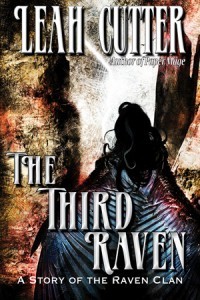 On July 9th, my new novel, The Guardian Hound, is being published by Book View Cafe.
On July 9th, my new novel, The Guardian Hound, is being published by Book View Cafe.
I AM SO EXCITED!
Ahem.
In the five weeks leading up to the novel release, I plan on publishing a short story a week, and having each available for free for that week. All the stories are about the world or somehow involved with The Guardian Hound and the raven clan.
I wrote this story, The Third Raven, in December 2011. When I was about halfway finished with it, I realized I had an entire world in my head and I could easily set a novel there.
In 2012, I attended a workshop where one of the assignments was to write a short story about a first date, set now–it couldn’t be historical or future. I couldn’t figure out what to write for the longest time, and finally chose to tell a story about a modern day raven warrior trying to get a date.
That short story turned into the novel The Raven and the Dancing Tiger, which I will be re-releasing through Book View Cafe, also on July 9th. It’s the prequel to The Guardian Hound, though they each stand as separate books. (I’m also dropping the price for The Raven and the Dancing Tiger, for the month of July to $0.99.)
So here is the short story that started it all. Next year, I’ll write the third and last book in this world, called, War Among the Crocodiles.
Enjoy!
The Third Raven
Pedrek pulled his long raven cloak tighter across his shoulders. The wind blew more coarsely here, high on the cliffs overlooking the town of Sulwyn. Pedrek wondered if it was an omen, the cold wind foretelling a chilly reception in the town below.
They wouldn’t deny him entrance, of course. The wood and earthworks surrounding the town couldn’t stop him, and though they didn’t get many of his kind up here, they might even make him welcome, at least at the start. The novelty of a visiting raven warrior had gotten him two or three nights’ stay for free in other small villages. Maybe there was work here as well—bandits, unscrupulous tax collectors, or even a rotten Lowen or spell-worker—that the town would pay for Pedrek to clean up.
The steep roofs below told Pedrek the snow likely to come in the winter. He’d be long gone before it came, going south if he could, to islands where ice never clipped his wings. It would be a long, cold winter without Ebril, his mate. He sighed and looked out again.
A river coursed through the far edge of the town, next to the hills, large enough for merchants and their ships. From Pedrek’s high perch, the town looked peaceful and prosperous, just the kind of place he needed, at least for a while.
Harsh winds pushed at Pedrek, whipping the edges of his cloak. He should just leave now; give into the change and fly true. He stubbornly kept off his wings and instead returned to the trail, stomping the dirt with his very human feet, reminding his feathered soul that his human half had needs as well: companionship, cooked meat, warm fires, and four walls of safety at night. And maybe a few more coins to line his purse: Ebril had been sick a long time, but none of the expensive spells or potions had worked.
As Pedrek drew closer to the town he realized the earthworks hadn’t been maintained: They crumbled on the sides and the main gateway sagged. No one challenged him as he walked up the road. Likely there would be no work here for him, either. He’d just stay the night then, and continue his travels in the morning. He only needed a few more shiny coins before heading south.
Pedrek was used to the stares he received in small villages like this. He kept his back straight as he marched toward the piers, figuring any inns would be near there.
What Pedrek hadn’t expected was how startled the people seemed, pointing and whispering as he passed. He wondered what a previous member of the raven clan had done to garnish so much attention.
Before Pedrek got to the river, an old grandmother put herself directly in his path. “Have you come for Corin?” she demanded. Though she only came up to Pedrek’s chest, her fierceness matched that of the great mountain cat he’d seen defending her young. “Finally going to take care of your own?”
“For who?” Pedrek asked.
“Figured. Mighty raven warriors,” she said disdainfully. “This way,” she added, walking the direction Pedrek had been going, toward the water.
“What do you mean?” Pedrek asked. Raven warriors were usually treated with fear or drudging respect. Not dismissed by grandmothers with curls arranged by the wind and faces covered in wrinkles.
“This way,” was the only response he received.
Not two blocks away, on the boardwalk of inns and shops that faced the water, the old woman stopped and merely pointed. “There,” she said, spitting once before stomping away.
Mystified, Pedrek walked toward the shop she’d indicated, not seeing the boy until he was much closer.
Most of the raven clans manifested their human side with shock white or silver hair, nearly colorless eyes, and tanned skin. This boy had raven dark hair and eyes. He stood in the shadows, the sun casting wan light on his pale face. He wore the brightest white shirt Pedrek had ever seen.
It wasn’t until the boy moved—Corin, Pedrek assumed—that Pedrek saw what else the shadows had hidden.
Instead of two arms, the boy only had one.
The other was a raven’s wing, black as a nightmare.
Pedrek shivered, but bit his tongue, refusing to name his fear: half-breed.
# # #
“What happened?” Pedrek finally asked after the pair of them had stared at each other for long moments. Maybe people passed them on the boardwalk, but Pedrek didn’t pay attention to them, keeping all his focus on the boy.
Corin looked like he was about to take flight, but he stayed. “Cursed,” he said. He jerked his chin at the cloak Pedrek wore. “Is that what they’re supposed to do? Turn into a cloak you can carry around?”
“No,” Pedrek admitted. It was a popular myth, one that the raven clan didn’t discourage too much, giving the warriors more mystique. “It’s primarily just a cloak.”
The boy seemed disappointed. “So it can’t help me change all the way back?”
Pedrek shook his head. “But maybe I can help.”
Corin scoffed. “Told you I was cursed. I need some kind of magic. Not mere words about listening to my feathered soul.”
“Do you talk with your feathered soul?” Pedrek asked.
“No such thing,” Corin declared, staring at him.
Pedrek blinked, surprised. Corin was old enough—at least seven, he guessed—that the boy should have had contact from his feathered half. “Who cursed you?”
“Old Lowen up in the hills,” the boy said, looking at the ground.
Pedrek was certain the boy lied, but he wasn’t sure about what. “Who taught you about the raven clan?”
“Ma did. She’d known about them.”
“She’s dead?” Pedrek asked, wanting to be clear.
“Yes.” Corin looked up and glared. “Might not have been the same old Lowen, but it had to be something like that. She just—wasted away. As if something ate her from the inside out.”
That time Pedrek knew the boy spoke the truth. “Did she ever make plans for you? Arrangements to go into the guard?”
“No, why would she?”
“It’s tradition,” Pedrek replied. “And you need it—you need the teachings of Raven’s Hall for your raven soul.”
“But I’d have to leave here!” Corin exclaimed.
“Don’t you want to?” Pedrek asked, looking around. The river offered some open air, but there were still too many buildings, too many people. He was already longing for clear skies.
The boy shook his head, puzzled.
Pedrek suddenly was struck by how the boy may have been cursed: The Lowen witch hadn’t stolen his arm, or left him halfway between states. It wasn’t anything as obvious as that.
No, she’d stolen the boy’s raven soul, and left merely a wing in its place.
# # #
Pedrek had been born in a town far to the south and west. His father had been a well-known warrior, lost in a battle just after Pedrek had been born. Mama sold the lamps she and her sisters made out of pottery. Pedrek helped dab designs into the soft clay, his tiny fingers making patterns around the pouring hole. He loved making his own shapes, and if he hadn’t been born so blond and tan, maybe he would have become a potter, too.
On one particular day, when Pedrek was maybe four or five, he’d been playing in the back of the market stall all morning. He was too little to help Mama, but too big to be strapped to her back all day. He’d found a line of ants to play with. He used a stick to divert the line, making them march around the obstacle. Then he got two sticks and tried to make them march down between them, but they kept crawling over the sticks, keeping to their line.
When one crawled over Pedrek’s fingers, he brought it closer so he could see it better. Its antenna waved a lot and it marched across his hand, looking for something to eat, Pedrek assumed.
Pedrek was suddenly hungry as well. He looked at Mama, busy with a temple buyer, haggling over a sack of lamps. Then he looked at the ant.
Something Pedrek had never felt before pushed at him. Do it, it whispered.
Peter flicked out his tongue and easily picked up the ant, swallowing it whole.
More, said that quiet voice.
By the time Mama looked over, Pedrek had eaten a dozen ants or more.
“What are you doing?” Mama squawked, grabbing Pedrek by the arm, lifting him off the ground and shaking him. “You’re not supposed to eat ants!”
Pedrek, ashamed, looked down at his chubby fingers, at the ant bodies crushed between them, a few ants still blazing trails across his palms. He suddenly felt sick to his stomach.
“Ma’am.” A stranger called to them from the stall counter. He was a blond as Pedrek. “Is he raven-get?”
“Oh, lord, yes,” Mama said, brushing the remaining ants from Pedrek’s hands with an edge of her skirt.
“He’s ready for the training,” the man continued.
“He’s—he’s young,” Mama said, kneeling and looking Pedrek in the eye. She pushed the hair off his forehead, then cupped his cheek. Pedrek leaned into the contact, comforted that while Mama was still mad, she didn’t seem to be that angry.
Pedrek wanted Mama to keep looking at him, like he was all she saw, because when she turned away she looked both frightened and sad.
“No younger than I was,” the stranger said. “You must send him to the guard. Before he hurts himself.”
Mama nodded then crushed Pedrek to her, holding him tight. She didn’t let go all the rest of the day, holding his hand or cradling him close. That night, though he had his own pile of blankets, Mama let him crawl up into her big bed.
The next morning, the guard came, and it was a year before Pedrek saw Mama again.
# # #
“Can you help me?” Corin demanded.
Pedrek slowly nodded. “Yes. But we’ll have to go see the old Lowen.”
“Why?” Corin looked wary.
“I think she stole something from you,” Pedrek admitted. “We need to get it back.” He didn’t want to admit exactly what just yet.
“Really?” Corin asked, suspicious and skeptical. “Why would she listen to you when she wouldn’t even talk with anyone else?”
“Did any of them accuse her of stealing something specific of yours?” Pedrek countered.
Corin shook his head. His human hand reached across his chest and he slowly stroked the feathers of his raven arm, thinking.
“Then we will go see her in the morning,” Pedrek announced. “Now—you need to help me. Which inn should I stay at tonight?”
Corin led Pedrek a few blocks off the piers, walking along the high boardwalks to avoid the mud and muck of the street. The buildings were all wood, no brick or stone. The town was prosperous; Pedrek could tell by the number of specialty stores, not just a general mercantile but cloth, leather, and lamp vendors. The buildings were all wood, no brick or stone, with high, steep roofs and murals of folktales painted on the walls.
Pedrek booked a bed for two nights. Brae the innkeeper only charged him for one. “You do well for our Corin there and maybe I’ll drop a few more coins off.”
“Thank you,” Pedrek said, surprised. The room was a dorm with six cots. The wooden floors were clear of mud and the mattress smelled clean. It wasn’t as clean as any room in Raven’s Hall, but Pedrek was used to that now. He dropped his pack and spread the raven cloak over it. Most wouldn’t dare touch his belongs, afraid of spells that didn’t exist. All Pedrek did was smooth his palm over the feathers, leaving some of his raven’s awareness behind. If anyone did bother his things, he’d at least have a clear impression of him, her, or it.
Satisfied, Pedrek went back to the common room. A fireplace dominated the shorter wall, with a working hearth. A pole ran from the floor to the roof of the firebox, arranged with several iron arms that could swing over the fire for cooking, then back into the room for serving. Long tables with benches filled the floor. When he’d been younger, he’d often just slept in the common room of whatever inn he stayed at. Now his older bones appreciated a mattress. A tall bar stood in the other corner, next to the door. Pedrek put in his order for dinner as well as a pint of a local beer before sitting down at the main table.
Pedrek didn’t have to wait long until other patrons started to file in. Loud conversation filled the room and the scents of a spicy fish stew wafted from the hearth. Pedrek primarily listened to his companions, trying to spot ones who would talk with him.
After he’d eaten, he went up to the bar, ordered three pints, then sat down next to the two best candidates. They both thanked him with a grunt, a silent toast, and a long drink.
“Here for Corin?” asked the older man with silver hair. He had a rough, scrubbed face, as if the wind had scoured it and left it ruddy and pale.
“Yes,” Pedrek said. “Was looking to hear any tales of his da.” He knew Corin’s mother had been a local, and knew better than to ask about her, especially since she was dead.
“Not much to tell,” said the other. He was darker, with dirty blond hair and hazel eyes. “He wasn’t here long, two or three weeks maybe.”
“Really?” Pedrek asked, surprised. Most members of the raven clan mated once, and for life. “What happened?”
The men shifted and the quiet grew between them, until the first man spoke again. “Some say Morna’s father ran him off. Others claim it was the old Lowen, the same as cursed the boy.”
“He wasn’t driven off,” Pedrek said with certainty. None of the raven clan would have left his mate behind, no matter how hastily the match had been made. He wondered if it had just been a boy passing through, practicing his mating techniques and not expecting to be answered so quickly.
Pedrek took a deep draught when he had another thought: Had the Lowen stolen that young man’s soul as well? “What can you tell me of the Lowen?”
“She lives up Red Peak, near the pass. Some of the women in town use her as a healer.” Both men took large drinks, as if washing the taste from their mouths.
“Could she have had an earlier incident with Morna?” Pedrek asked finally, hoping the men wouldn’t take it wrong.
“She swore she only went up the once, to confront the Lowen after what happened to Corin. Came back more pale than a three-day frost. Wouldn’t hear of anyone else going back up,” the first man confided, nodding seriously.
The darker man scoffed. “Of course that didn’t stop some fools. Marched up the hill and got lost for days before they made their way back. Men born here,” he emphasized. “Lowen can’t be found if she doesn’t want to be.”
“Think she’ll see me?”
The two men considered the question so long Pedrek feared they wouldn’t actually form an answer. Finally, as one, both men drained their pints and stood.
“Aye. She’ll be curious enough to see you,” said the first.
“Just make sure you see her, too,” said the other. Then the pair of them turned and walked out the inn, leaving Pedrek to ponder their words alone for the rest of the night.
# # #
The first prevailing fact young Pedrek noticed when he came to Raven Hall was the warmth: Each walkway and room had either a fireplace or a stove. Window wells and walls wore blankets so drafts couldn’t get in. Candle stands stood beside each desk in the classroom so no one took a chill.
Pedrek’s raven soul basked in the tropical, sheltering heat. Though the youngest students were frequently seated farthest from the flames, Pedrek never really felt cold.
The next omnipresent fact about the hall was the writing. Every student, no matter what age they entered, learned their letters. Not just to read, but to write as well, diligently marking up clay tablets or using chalk on freshly cleaned slates. Day after day they learned until all in Pedrek’s class could be called literate.
The third fact, which Pedrek never mentioned to another soul even decades after he’d left the hall, were the recitations. They’d started simply enough: Every student had to write down the verse their tutor said, quickly and correctly. When they’d reached a certain accuracy their tutor announced a guest visitor.
Old prefect Aderyn stomped her way to the head of the classroom, leaning heavily on a cane. One eye stared at them, clear as morning skies. The other was merely a hole, empty and scarred with black skin and red veins. She wore a misshapen gown, and it was whispered it hid other deformities.
Aderyn thumped her cane to make sure everyone in the class was paying attention. She announced the recitation and waited a moment while students got ready.
Into the poised still air, Aderyn began a different recitation, one the children had never heard before but would hear many times afterward.
“I will not eat bugs or insects.”
A couple of boys sniggered. Aderyn silenced them with a thump of her cane. “I will not eat bugs or insects,” she repeated.
Pedrek felt nauseous suddenly, but he wrote out all the words.
“I will not eat the dead mice in the yard,” Aderyn recited next.
The older student at the end of the bench shifted nervously in his seat. Pedrek exchanged glances with his friend beside him. They’d both heard the rumor, of course, but none of the younger ones had dared asked what had actually happened.
“I will not eat animals rotting in fields or forests,” Aderyn instructed.
Pedrek wrinkled his nose. He found this one easier than the first two. He’d never do such a thing, he was certain.
“I will not eat the dead.”
The words rang ominously through the hall.
“I will not haunt the battlefield or feast on human flesh.”
Pedrek shivered and tried to write the words down, though his raven soul stirred now, needling him for attention.
“I will not pluck out a corpse’s eyes,” Aderyn announced to the now silent classroom. She stared at them, her one remaining eye unblinking. “Because that corpse might rise up to slaughter me like the half-breed I am.” No one even pretended to keep writing, the words ringing terrible and true.
Half-breed was the worst insult the children could fling at one another. It meant someone who wasn’t fully human or raven and who had their human and raven souls misaligned; half here, half there, and never truly whole.
“I will not suffer the half-breed.”
# # #
The morning brought winds that promised snow before night. The cold made Pedrek draw his cloak tighter across his shoulders as they started up Red Peak. Corin didn’t seem to notice the bite in the air: either he was too used to the cold or too excited. Possibly both.
They followed rutted dirt roads out of town, passing from the boardwalks to the ground, detouring around wide frozen puddles. The lands stayed pretty even as they passed the fall fields, barren but fringed with trees still holding their colors.
Pedrek tried to talk with Corin, but the boy had lost much of his brashness from the day before. As they took their first break from walking steadily up the hill, Pedrek asked, “So what really happened with the Lowen?”
Corin’s scowl returned. “She cursed me. What else do you need to know?”
Pedrek shook his head. “She stole something. And I still don’t know why. Or why your mother didn’t fight harder to get it back.”
“What do you mean?” Corin asked, worried. “She fought. She fought really hard.”
The uncertainty of Corin’s claims echoed around them. “No, she didn’t, and you know why,” Pedrek accused the boy.
Corin pressed his lips together and mulishly raised his chin. After treating Pedrek to a few moments of silent glaring, Corin finally muttered, “Doesn’t matter. You’ll likely find out soon enough.” He refused to say anything more, but marched away, back up the hill.
As they walked further away from the trees crowding the road and back into true hills with craggy rocks, Pedrek longed to take wing. He wanted to float up and see the cliffs from afar. His legs ached from constantly climbing and the silence of the boy chafed him. However, he dared not leave Corin, and he wasn’t sure how the old Lowen would react to his raven form.
Just before midday, the road veered to the right. Corin picked the trail to the left, across the face of the peak. It was clear and flat, a welcome change to the winding road they’d been following.
The trail suddenly ran into a large grove of trees. Pedrek saw a glimmer and stopped Corin with a hand on his arm. “I should go first now,” Pedrek said, drawing Corin behind him. He took a few steps, then realized the boy had stopped. He turned to look.
Corin stood in the center of the trail with his human arm akimbo and his head tilted to the side.
Pedrek’s soul lifted. It was the first birdlike gesture Corin had made.
“Why are you all fluffed up like that?” Corin finally asked, his human hand gesturing toward Pedrek’s cloak.
“There’s some sort of magic there,” Pedrek said, indicating the trees.
“Where?” Corin said, staying where he was but staring hard at the trees.
“You’re young yet,” Pedrek lied. “Too young to see.” Corin’s raven soul should have detected the charm in the trees, though it wouldn’t have been trained to identify it: a simple spell to make the location seem darker and more ominous.
Corin looked a bit more, then shook his head, crestfallen. “Her place is just through there,” he said, indicating the trees.
“Are you frightened of the woods?” Pedrek asked.
“Of course not,” Corin claimed boldly.
“If you think they’re dark while we’re walking through them, you should touch my cloak,” Pedrek told him. It didn’t have a lot of magic, but just enough that might clear the boy’s vision.
Midway through the trees, Pedrek felt cautious fingers along his back.
“This is better,” Corin admitted softly after a few more steps.
Pedrek merely nodded and kept walking.
The trail opened up into a fair meadow. The grass shone summer green, the winter-weighted wind clamed, and the sun shone clear and blue. Conifers circled the meadow, dark prickly guardians. A tiny creek burbled across the center, and on the far side stood a picturesque white cottage.
Charms twinkled here, too. Pedrek recognized the ones to increase the beauty and bring calm, but the others were too advanced for him. He would have little recourse if it came to a battle of magic.
As they walked across a figure exited the cottage and began toward them. Pedrek knew it had to be the Lowen, but she appeared to be a young girl. Given the warnings from the night before, Pedrek stopped and asked his raven soul to help. The squawked reply came so quickly and so loudly it startled him, causing him to shake once from head to toe.
When Pedrek’s vision had cleared, he looked around again. Most of the color had bled out of the day. The charms lost their sparkle, and instead, seemed like dull dolls made out of hair, yarn, and twigs. The woman approaching them now looked stooped and ancient. Pedrek stared at her. She met his gaze from across the meadow and gave him a death’s-head grin.
A tug on his cloak made Pedrek swing around. It was merely Corin though. “Your eyes are black,” Corin exclaimed.
“Yes,” Pedrek replied, the word coming out in a birdlike croak. He cleared his throat and pushed back. He needed his human voice. “Yes,” he said again, stronger this time. “Let’s go meet the Lowen and find out where’s she’s hidden your raven soul.”
The boy looked startled by Pedrek’s declaration, then threw his shoulders back, determined, marching across the field, raising first a human arm, then a raven’s wing, in time with his feet.
Pedrek threw a quick prayer to both Wynne, goddess of the ravens, as well as Tamsin, god of lost causes.
# # #
“I know why you’ve come,” the old Lowen cackled from her side of the creek. “And I’m not changing him back.” She wore a patchwork quilt as a cloak, spells woven into each section. A bright blue wimple captured most of her iron gray hair, but long wisps still hung down beside her face. Her eyes matched the blue of the wimple, as piercing as a summer sky. She leaned heavily on a stout cane, the head gnarled and rubbed smooth with age.
“Why did you take his raven soul?” Pedrek asked, determined to be as polite as he could be. He knew he could still escape if it grew nasty, but he’d never get the boy away unharmed.
“So those eyes see more than just worms,” the old woman muttered. “He didn’t know how to control it,” she accused, indicating Corin with her chin. “Came up here and caused mischief most every day. Wouldn’t stay away.”
“He was just a boy, not even a teen,” Pedrek pointed out reasonably. “No one had trained him yet.”
“Because you always care for your own, right?” the Lowen said, pointing her cane at Pedrek. “None of you even knew he was here.”
“If his father had lived until he’d been born, we would have known. And someone would have come,” Pedrek insisted.
“‘Twasn’t me who shot the fool,” the Lowen growled. “Idiot hunters from the other side of the pass had done it for sport, then come running to me when the bird turned into a man on the ground.”
“Why didn’t you say anything to his wife?” Pedrek demanded.
“Weren’t married now, were they?” the woman asked slyly. “They’d just been playing house. Didn’t know about it for years, until his young’un come to pester me.”
“He needs to be whole,” Pedrek insisted.
“Not gonna give it back,” the Lowen said, crossing her arms across her chest and staring hard at him.
“Why not?” Pedrek asked into the growing stillness on the hill. Even the bird song from the nearby trees had died. “What happened? What did he do?”
“He won’t tell you?” the Lowen asked.
Pedrek shook his head.
Corin turned his back on both of them.
“Got hungry while him and his friends were playing, didn’t he? Had a knight here, proper warrior of the king. Had done what I could to save him, but he’d been brought to me too late.”
Pedrek had to swallow hard against the sudden dryness in his throat. “Go on,” he directed her, though he didn’t want to hear the rest.
“This one and his two friends decided to snack on the body. By the time I came back the other two had snagged his eyeballs, and this one, his tongue.”
Pedrek held himself very still, reminding himself that Corin hadn’t been taught his letters or his recitations, hadn’t been schooled about his raven soul, didn’t know how to placate it.
Corin wasn’t a half-breed.
“Now, I don’t blame critters for doing what they’re born to do, but he knew better,” the Lowen finished, pointing at Corin.
“I did not!” Corin said hotly, turning around. “I thought it was fine when I was a raven!”
“He was never trained,” Pedrek said. “His human soul knew better, but couldn’t share that.”
The old Lowen shook her head. “He knew. He sat and laughed at me, daring me to do something after I chased his friends away.”
“He didn’t know,” Pedrek maintained, unsure if he spoke the truth. It was possibly Corin’s raven soul had known, but just not cared.
# # #
The first time Pedrek saw battle, neither his human or raven soul rejoiced. There was too much fear, too much nervous exhilaration, too much boredom, and then, finally, too much dirt and blood. It was impossible to know who’d won the first skirmish. After the violent clash both sides were allowed to treat their wounded and carry away their dead.
Everyone had looked strangely at Pedrek when he’d volunteered to help clear the field. He’d been paired with an older man named Reece, who had bright cooper curls and white skin covered in freckles. They carried corpses between them on a stretcher, stacked two and three high.
“He working all right?” people asked every time they came back with a full load. To which Reece always cheerfully replied that he’d only thrown up once, which was kind, because Pedrek had had to stop more than once to settle his stomach.
“Why do they keep asking that?” Pedrek said after the third time.
“Your kind tend to stay away after the fighting,” Reece told him with a grin. “Seeing the state of your stomach, I can see why.”
Pedrek nodded, not bothering to tell Reece the truth. The recitations had been drilled into him, into every person in the raven clan. He didn’t fear breaking those laws: his human and raven selves were better aligned than that. The reason he’d volunteered was because he’d still had to know what it felt like to be so close to the newly dead. His raven soul had awakened hungry, but Pedrek had soothed it with visions of clear skies, promising a good long flight the next day, as well as digging out the shiny glass beads hidden at the bottom of his pack and keeping those under his pillow that night.
As the night grew longer and fewer men moved about the field, scavengers came. Reece and Pedrek worked as quickly as they could, but they were always shooing them away.
More than once Pedrek recognized the birds.
The next day Pedrek went to the chief of his line. “I volunteered last night to help clear the dead.”
“I heard. Good man,” the chief exclaimed. Then he paused. “Ah. You’re curious about the ones who visited the dead not in human form.”
Pedrek nodded, angry and afraid.
“You’ll see. We always take care of our own, son.”
Before the last battle, Pedrek noticed that only one of those who’d eaten the dead were still alive. He didn’t know if it was fate or the chief’s hand directing the others into the heat of battle. Pedrek searched out the one who remained, finding him looking out over the field as if he were already dead. “Why did you do it? Break the recitation?” Pedrek hissed at him quietly.
The man shrugged and looked at him with all black eyes. “Don’t care,” he squawked.
A welcoming nod came from Pedrek’s own raven’s soul. It didn’t care, either. However, it let itself be consoled with smaller things because it did care for Pedrek in its own, small way.
# # #
“The boy is my responsibility now,” Pedrek told the Lowen. The beautiful summer day had grown cold and clouds now covered the once-clear sky. Wind coursed through the trees surrounding them, tossing the heads of the pines.
The old Lowen’s eyes grew crafty. “You’ll take him with you?”
“I will,” Pedrek vowed. “I swear by my raven’s soul.”
“So you do take care of your own.”
“You’d take me with you?” Corin asked.
“To Raven’s Hall. You must be trained,” Pedrek said, intending to get the boy the help he needed. Belatedly, he remembered Corin only had a single soul. “You might be able to come back later.”
“I don’t want to leave,” Corin said. “But if she gives me my raven’s soul again, I can learn to be a warrior like you?”
The Lowen snorted, but Pedrek nodded solemnly. “Yes, most of the raven clan earn their keep, hiring out as warriors for a while.”
“Then yes, I’ll go with you,” Corin said. He finally turned and addressed the old Lowen. “Please.”
“Ah, didn’t think you knew that word,” she said. She lifted one side of her quilt, reached into a deep pocket and pulled out a raven-black egg. A golden web of strings bound it tightly. “Here,” she said, tossing it to the boy. “Swallow it.”
Corin glanced wide-eyed at Pedrek, who nodded. He suspected the Lowen wouldn’t hurt the boy now that Pedrek had promised to take him away. The boy was now his responsibility, and the raven clan did take care of their own.
“Do as she says,” Pedrek told Corin as he continued to hesitate.
With one last shudder, Corin closed his eyes, opened his mouth, and shoved the egg inside.
The egg collapsed as soon as it touched his tongue, flowing dark and pure out of the eggshell, down Corin’s throat as well as out of his mouth. It dribbled down his chin and across his shoulder to the one raven’s wing. The droplets sucked the darkness into themselves as they rolled down, leaving a pale boy’s arm behind.
Corin’s hair also grew pale, and when he opened his eyes, they’d changed to the color of morning mist. After his raven’s soul had settled, only a shock of black hair remained, dripping over Corin’s eyes.
“Thank you,” Pedrek told the old Lowen, heartfelt and warm. It was good to see the boy whole.
Corin lifted first one arm then the other, staring at all ten fingers.
“Don’t be thanking me yet,” the Lowen cackled. A cloud quickly gathered around her. The next moment, she was gone.
“Where did she go?” Corin asked, looking around, seeming frightened.
“Away,” Pedrek assured him.
“I’m glad you chased her away,” the boy told him before taking a running leap into the air and changing into his raven form, leaving his clothes behind.
“I didn’t chase her anywhere,” Pedrek muttered. “And I’m not chasing you, either,” he added after he picked up the clothes and began walking back to the trees.
By the time Pedrek had reached the road, Corin had joined him in human form. The natural grace of the raven clan had returned and Corin walked light on his feet. After he dressed, he still shivered. Pedrek had him walk beside him so they could share the warmth of his cloak.
Before they reached the town, Corin had started listing every sight in the kingdom that he just had to see.
“Won’t you miss here?” Pedrek asked softly.
Corin looked up toward the darkening sky. “I—we—don’t belong here.”
“Then let’s go tomorrow,” Pedrek replied, getting a bright smile in return.
That night, under not just piles of blankets but his cloak as well, Pedrek slept deeply, dreaming of open blue skies and easy meat.
# # #
They left town quickly, both of them anxious to get on the road. More than one of the locals shook Pedrek’s hand as a thank-you for taking care of their Corin.
Corin promised to visit when he could, though Pedrek made certain that he made no such vows. He knew Corin meant well, and maybe he’d fulfill them.
Pedrek remembered how awkward it was every time he’d visited Mama after he’d gone into the guard. How little she knew of the world while the ravens shared news from all the different kingdoms, even those across the sea. Their old house was so cold compared to Raven’s Hall, and dirty as well. Growing up he’d never been aware of how many bugs shared their quarters; after the recitations, he couldn’t think of anything else.
Their packs were fully loaded with dried meat, bread, and cheese, their flasks were full when they started their journey. As they walked, Pedrek encouraged Corin to regain his raven form, fly, and save his feet. Pedrek even carried Corin sometimes, a squawking bird on his shoulder or nestled under his cloak.
Every night, by the light of the fire, Pedrek made Corin draw letters in the soft dirt. He knew he had to rush things for Corin, so he also started with the simplest of the recitations as well. He could never be as impressive as Aderyn, but he did his best to impress Corin how important it was to not eat human flesh. He made the boy repeat the lessons until he’d memorized every line. As a reward, he answered Corin’s questions about being a warrior, cleaning up some of his battle stories. There were a few that had been more exciting than terrifying.
As they reached the rolling hills that spread out into the flatlands, the wind carried the scent of lime, decay, and dark spells.
When Corin asked about it, Pedrek didn’t think to lie. “It’s the smell of battle. At least a few days old.”
“Can we go? Can we see? I’ve never seen a battle before.”
“All right,” Pedrek said, pushing down on his anxiety, telling himself that it was merely the thrill of the battle, not the lure of the corpses that was drawing Corin.
On the far side of a scorched field, workers still buried the dead in a long trench. Healing tents sat not too far off, with only a few soldiers remaining behind. Pedrek hadn’t been asking the local birds for the news; he vowed to do so in the morning, see if there were roads or lands ahead that weren’t safe for him and a boy.
That night, the sound of wings woke Pedrek. Corin had changed form and gone.
It was easy enough for Pedrek to get to the battlefield quicker than Corin, a touch of magic aiding his flight. He waited in human form for Corin to arrive, hoping he’d been wrong. He had to breathe out harshly as the raven delightedly tore into the waiting flesh, playing with entrails and flapping skin.
When Pedrek could finally control himself, after he’d quieted his raven’s soul enough, he stepped into the opening. “Come here, Corin,” he called softly.
The boy was still young. He didn’t recognize the glimmer in Pedrek’s hand as the enticing magic it was. He hopped his way over to Pedrek, then looked at him, tilting his head one way, then the other.
Pedrek kept his movements steady and gentle, bending down to give the bird a lift up, stroking its body tenderly, whispering to it, “It’s all right. It’s all right.”
Before he suddenly snapped the raven’s neck.
The next morning another grave had joined the others on the battlefield, and Pedrek continued his journey by himself.
The raven clan always took care of their own.
Crossposted from my website. If you'd like to comment, you can do so here or there.
June 2, 2013
Story Inspiration Sunday
Today, I figured I’d turn back to one of my first loves, fashion. I also do these blogs over on the Book View Cafe blog. Feel free to comment here or over there.
I adore the way her skirt flares up, how like a bird she is, and yet, so powerful. Though she’s in black, and backlit, my first thought is, “how do I take such a being who is poised for evil and portray her as good”?
I think a lot about good and evil, and I write about it as well (though I try not to ever be preachy.) I think a lot about the stereotypes, how to play with them, and overcome them.
For example, this picture:
I love how she’s going up. I’d love to have some kind of adapted version of this for a cover sometime. I find the image very striking.
But is she going to heaven? Or is she so determined to climb to the top that she’s creating her own version of Hell, not only for herself, but for the entire world?
And then there’s this one, here:
Is she good? Evil? Just her own being? I love the pop of yellow color on her lips. Why is that there? What does that symbolize?
These pictures don’t tell as much of a story as other photo shoots I’ve seen, not viewed together. Yet each, individually, has something to it.
What do you see? What would you write about? If these pictures inspire you to Story, please, go ahead. Whatever you write will be 100% different than anything I ever get around to doing.
All pictures from ELLE Thailand. The shoot was called, “Magnificent and Holy.”
Photo Credit: Nat Prakobsantisuk for ELLE Thailand via TFS.
Crossposted from my website. If you'd like to comment, you can do so here or there.
June 1, 2013
More deep thoughts
Had an interesting realization today.
The most important thing for the day, today, was typing up chapter eight.
33589 / 70000
I was about halfway through, taking a break, when I realized that for some reason, I felt I wasn’t doing the most important thing.
Where the hell was that coming from? Writing is the most important thing. But I’ve had twinges of this before.
I poked at my brain for a bit, and finally realized it was because I wasn’t “working.” Writing isn’t work. It’s play. It’s fun. Somewhere deep in my head, from my Calvinistic-Victorian upbringing, I still have residues of work = important, play = not important.
Writing is important, and it doesn’t matter if it feels like play or not. Yet another invisible script for me to rewrite.
A few weeks ago, I bought mason bees and a little bee house for them. Though I’ve been seeing more bees around my property, I didn’t know if the mason bees had stuck around, and were using their house. Today, I’ve been able to work outside and I watched them going in and out of the house all the time. I’m quite pleased by that. And the tremendous number of birds in my yard. As well as the BEAUTIFUL rogue roses. I’ll have to post pictures sometime soon. They’re a brilliant, deep red, with furled petals, and they smell heavenly, that rich, heavy, old rose scent.
And now that I’ve finished the most important thing, I need to go do everything else.
Crossposted from my website. If you'd like to comment, you can do so here or there.
May 27, 2013
Deep Habits
A couple weeks ago, I took a three-day class covering “The Seven Habits of Highly Effective People.”
Most of the material wasn’t new to me. For example, habit one is about being proactive. Part of that is eliminating “have to” from your common, everyday usage.
Years ago, I made the decision that I was no longer going to say things like, “I have to write tonight.” It was going to be, instead, “I get to write tonight.” Simple change, but it helps create a sense of anticipation and excitement in me. It’s also more accurate. I love writing.
Habit three is about first things first. For me, for decades now, the writing has been the most important thing in my life. Activities that don’t support the writing get jettisoned. I’m kind of ruthless about it.
This weekend, I’ve had a bunch of things that needed doing. I decided to make a list and order it. I needed to write two chapters in “Siren’s Call” this weekend. Without thinking about it, without any debate, the writing went first on the list. Everything else could fall afterward. It was a good validation for me, that not only do I say the writing comes first, I live it.
I got back the copyedits for “The Guardian Hound” as well as some other comments, and I started going through them today. Part of me feels like I’m not doing the right work, the most important work. When I stopped to figure out what that meant, I realized it meant writing the next chapter in the current novel.
Deep habits.
I don’t know how long “Siren’s Call” is going to be. I kept thinking it was 85,000. But when I look at what I’m writing, the outline, the novel doesn’t reach that long at all. It’s between 60-70,000 words. So I’m going to stick with that for now, with the right to change my mind if it does grow.
25356 / 70000
Crossposted from my website. If you'd like to comment, you can do so here or there.
May 26, 2013
Story Inspiration Sunday
I blog about this both here and over at Book View Cafe. Feel free to comment either here or over there.
When I moved into my house about three years ago, I had no idea that I was horribly allergic to a plant in the front yard.
I didn’t find out about it until after I’d been there a year. I had spent most of a Sunday puttering in the yard, both in the front and the back. Later that night, my arms itched and hurt. When I finally stopped to look, I found I had welts running across them. It looked as though I’d been whipped.
It wasn’t until I brushed up against the demon plant a second time that I was able to pinpoint the culprit.
Innocent enough looking, no?
I had never liked that plant, and now I had a good reason to get rid of it.
So, what about that story inspiration?
Like most writers, when faced with a mundane task like sweeping the floor, dusting, or taking clippers to a hellish plant, I began to “storify” my experience.
Taking the top of the plant out wasn’t the hard part. No, one of the reasons I had always despised it was because it sent out shoots and was constantly trying to take over that entire bit of the yard. After I dug out the monstrous roots of the main plant, I started digging and pulling out all the shoots.
Each root would shoot out singly until it reached what I called a junction point. From there, it would multiple into four or five more more long roots.
Suddenly, I was a farmer, human, on far away planet, attempting to save my crops from this alien beast. Common wisdom was that you didn’t have to kill all of it, just enough of the root system.
But what was enough?
The roots in my yard were entangled with the white slimy bulbs of what’s locally referred to as Squill — a hybrid Spanish Bluebell that grows like a weed here in Seattle. They’re pretty enough in the spring, but they’ll choke out all your other plants, given a chance. The only way to get rid of them is to dig out the bulbs.
What if my farmer also found such roots? That the two plants seemed to be growing together? Looks out over his field, toward the house, surrounded by the pretty blue flowers that his new wife loves so much.
Tearing them out is going to break her heart, as well as test their already shaky union. But the plants need each other. If he doesn’t kill them both, he’ll lose his crop. What’s he going to do?
I don’t know if I’ll ever write this story, called, “The Farmer’s Dilemma.” I may, though. And the answer to his question may be found in the huge “birds” that flock to his newly plowed fields, with weird, fur covered exoskeletons and long, hooked beaks.
As always, if this inspires you to go finish the story, please do! What you create and what I create will be 100% different.
Crossposted from my website. If you'd like to comment, you can do so here or there.
May 19, 2013
Story Inspiration Sunday
I also blog about these things over at Book View Cafe. Feel free to comment either here or over there.
My writing process has evolved and changed over the years. I anticipate it will continue to change.
Currently, I write everything out by hand, first, then type it up on the computer. Creating fiction using this process ensures that it starts as fun for me.
I have a day job, and I’m on the computer all day long. Therefore, somewhere in my head, I’ve equated “computer” with “work.” It doesn’t matter that I use a different computer, in different parts of the house (or at a coffee shop.) Computer equates work, to me, which is the opposite of creative.
So I hand write everything first. I draft either an entire short story, or a chapter, before I type it up. One of the good things about this process means I have pretty clean first drafts. At this point in my career, the percentage of what’s on the hand written draft that makes it into the typed draft can vary between 70-98%, depending on the piece.
So what does that have to do with inspiration?
I write with very good fountain pens, on very cheap paper. (That way, if something isn’t going right, I have no problem tearing out those pages, crumpling them up, throwing them away, and starting from scratch.) I used to do a series of posts about “pen porn” — those pens I’d love to acquire if money was no object.
I also find some of the fancier art pens inspiring. They make me want to tell stories about them, or their owners.
I’ve always had a soft spot for the Jules Vern Squid Pen.
And though it has great reviews in terms of how it writes, I still think of this as a trophy pen, something you get for a reward, not a working pen.
Because that’s the problem with a lot of the fancy pens: While they look pretty, they write like shit.
Jean-Pierre Lepine’s pens are an exception. I own one of his pens, have tried others, and have always thought about getting more, because they write so dang well.
And who wouldn’t want to write about an entire, ornate, steampunk world in which this pen would be a part of?
(Click here for more reasonably priced Jean-Pierre Lepine pens.)
These pens inspire me to get my butt in the chair, and get to writing, so that maybe one day, I could afford something like the above.
What inspires you to write?
Crossposted from my website. If you'd like to comment, you can do so here or there.
May 10, 2013
Once more, with feeling
I’ve started working on the next novel, “Siren’s Call.” I wrote the first three chapters while I was in New Orleans, and for various reasons, stopped.
On first glance, I had assumed that I could use at least half of what I’d originally written.
I just finished redrafting the first chapter. And yes, much of it was redraft, that is, I would look at what was there, would say, “That won’t do at all. Delete. Delete. Delete.” And then wrote from scratch what should have been there instead.
I figure I only kept about 25% of what I’d originally written. If that.
So the first chapter is 800+ words longer, and oh, so much better. It’s about 4500 words long now. I anticipate I’ll do that with the next two chapters as well.
I’m so very pleased with all of it.
Crossposted from my website. If you'd like to comment, you can do so here or there.
May 7, 2013
And the blooming flowers of spring
Though fall is my favorite season, I love the Seattle spring, and I particularly adore all the flowers blooming in my yard. (True fact: one of the paths to my heart is to bring me flowers regularly.)
So under the cut are pictures! And more pictures! And even more pictures!

I cleared out a bunch of weeds in this area when I first moved in, and up sprang this rose bush! So I’ve always called this my rogue rose bush.
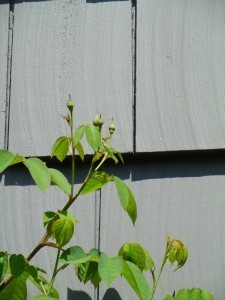
Buds on the rogue rose bush! I was told the rogue rose bush would probably never flower, and it didn’t the first couple of years. But it may flower this year. There are a lot of bud on it.
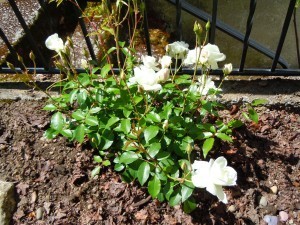
Roses are one of my favorite flowers. So I decided I’d try growing some. This is one of my newly planted rose bushes.
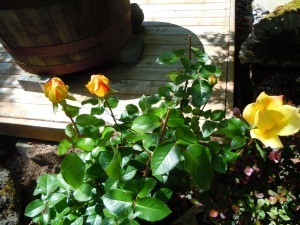
Another newly planted rose bush, with FRAGRANT red and yellow roses. One of the rose buds broke off while I was planting this bush on Sunday. I put it in a vase in my kitchen. This morning, when the bud opened, it scented my entire kitchen. I’m amazed that such a small blossom puts out so much rose scent.
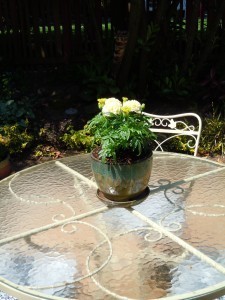
Mums for the table on the deck.
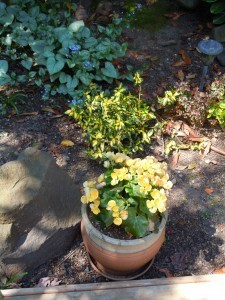
A begonia that a guest left for me as a gift.

Small azalea bush on the side of the house, next to the brick walkway.
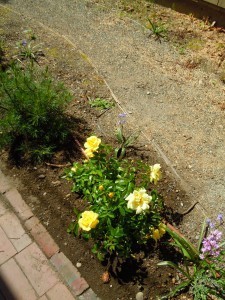
Another new rose bush, also planted on the side of the house, next to the brick walkway.
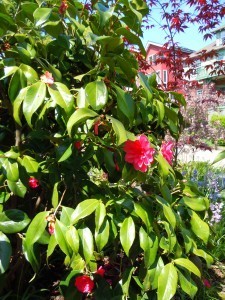
I have a three of these camellias. The two in the backyard are smaller and don’t bloom as much as the much larger bush out front.

Another azalea bush. I have several, actually. Only two are currently blooming: The others have bloomed and faded.

I have a lovely golden chain tree out front. I actually have two of them, but the other is confused, and has both yellow and pink flowers on it.

The roddie is really beautiful right now, in full bloom.
Crossposted from my website. If you'd like to comment, you can do so here or there.


